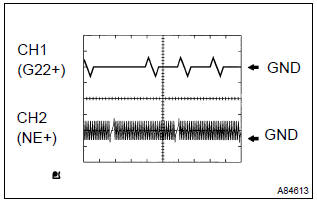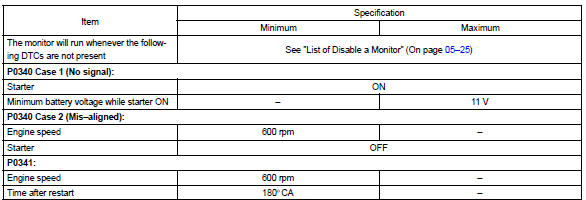Toyota Corolla (E120) 2002–2008 Repair Manual / Diagnostics / Sfi system / Camshaft position sensor ”a”
circuit / Circuit description
Toyota Corolla (E120): Circuit description
The camshaft position sensor (g22+ signal) consists of a magnet, iron core and pickup coil.
The g22+ signal plate has 3 teeth on its outer circumference and is installed on the camshaft timing pulley.
When the camshafts rotate, the protrusion on the signal plate and the air gap on the pickup coil changes, causing fluctuations in the magnetic field and generating an electromotive force in the pickup coil.
The ne+ signal plate (crankshaft timing pulley) has 34 teeth and is installed to the crankshaft. The ne+ signal sensor generates 34 signals at every engine revolution. The ecm detects the crankshaft angle and the engine revolution based on the ne+ signals, and the cylinder and the angle of the vvt based on the combination of the g22+ and ne+ signals.


Reference: inspection using the oscilloscope.
Hint
: the correct waveform is as shown on the left.

Monitor description
If there is no signal from the camshaft position sensor despite the engine revolving, or if the rotation of the camshaft and the crankshaft is not synchronized, the ecm interprets this as a malfunction of the sensor.
Monitor strategy

Typical enabling conditions

Typical malfunction thresholds

Component operating range

Wiring diagram
Refer to dtc p0335
Other materials:
Rear seats
The seatbacks of the rear
seats can be folded down.
Folding down the rear
seatbacks
1. Move the front seats forward.
2. Stow the rear armrest. (if
equipped).
3. Fold the seatback down while
pushing the seatback lock
release button.
Each seatback may be folded separately.
WARNING
Observe the follo ...
Pressing power switch does not start system
Wiring diagram
Inspection procedure
1 Inspect radio receiver assy(+b, acc, gnd)
Check that the continuity between terminals at each
condition, as shown in the chart.
Standard:
Check that the voltage between terminals at each condition,
as shown in the chart.
Standard:
...
Warning light and warning buzzer list
*1: Parking brake engaged warning buzzer:
*2: Open door warning buzzer:
*3: Vehicles with a drive monitor display
*4: Vehicles with a multi-information display
*5: Driver’s seat belt buzzer:
Vehicles without a smart key system: The driver’s seat belt buzzer sounds to alert
the d ...


